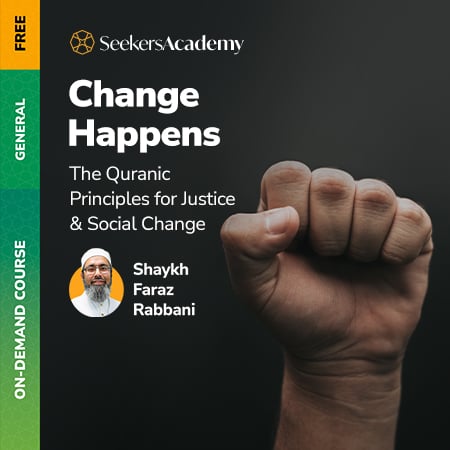
What is change? How does change happen? What is the purpose of change? What are the spiritual and worldly keys to change—for the individual, for groups, for communities, and for believers?
In this first segment, Shaykh Faraz Rabbani explores the idea of change by clarifying the key terms related to this concept. He looks at the scholarly definitions for (1) change (taghayyur), (2) changing (taghyir), (3) reform (islah), (4) corruption (ifsad), (5) justice (ʿadl), (6) excellence (ihsan), (7) rights (huquq), and responsibility (fard/wajib) and how these key concepts fit into the Islamic idea of personal and social change.
In the second part, Shaykh Faraz Rabbani begins by looking at Qur’anic verses (6:52-53), where he explains the verse “Allah does not change a blessing He bestows upon a people until they change what they are upon.” Commenting next on a verse where well-off people who met Allah’s favors with ingratitude were recompensed with hunger and fear (16:112), he explains that gratitude is a key to change, and outlines some practical steps for its deployment. Next Shaykh Faraz looks at the relation of striving and struggle with change, looking at two sets of verses of the Qur’an: “And those who struggle for Us, We will surely guide them along our ways,” (29:69) and “And by the human self and how He fashioned it and inspired it to its corruption and its consciousness. Successful indeed is the one who purifies it. And a true failure is the one who corrupts it.” (91:7-10)
In the third part of this seminar, Shaykh Faraz looks at making change happen and key Prophetic guidance on change. He starts out by exploring the Prophet’s command to change any wrong one sees with one’s hand, one’s tongue, or, finally, one’s heart. Next, he looks at the hadith ”The strong believer is better and more beloved to Allah than the weak believer,” and explores the idea of having true strength. Shaykh Faraz begins the final segment “The Prophetic Vision—Prophetic Silence and the End of Religion” by listing the five higher aims of the religion outlined by the scholars: preserving (1) religion, (2) life, (3) intellect, (4) property, and (5) honor. He sheds light on a hadith on the long silence of the Prophet. He closes by looking at the end of religion—closeness through excellence—and how to find one’s pathways to closeness in one’s personal life, social life, work, and free time.
- Teacher: Shaykh Faraz Rabbani
At the end of the course, students will be able to:
- Define change and key terms related to the concept of change.
- Understand the Islamic perspective of personal and social change.
- Explain practical steps to the deployment of change.
- Understand the concept of strength in Islam.
- Contextualize the hadith of changing a wrong with one’s hand, tongue, or heart.